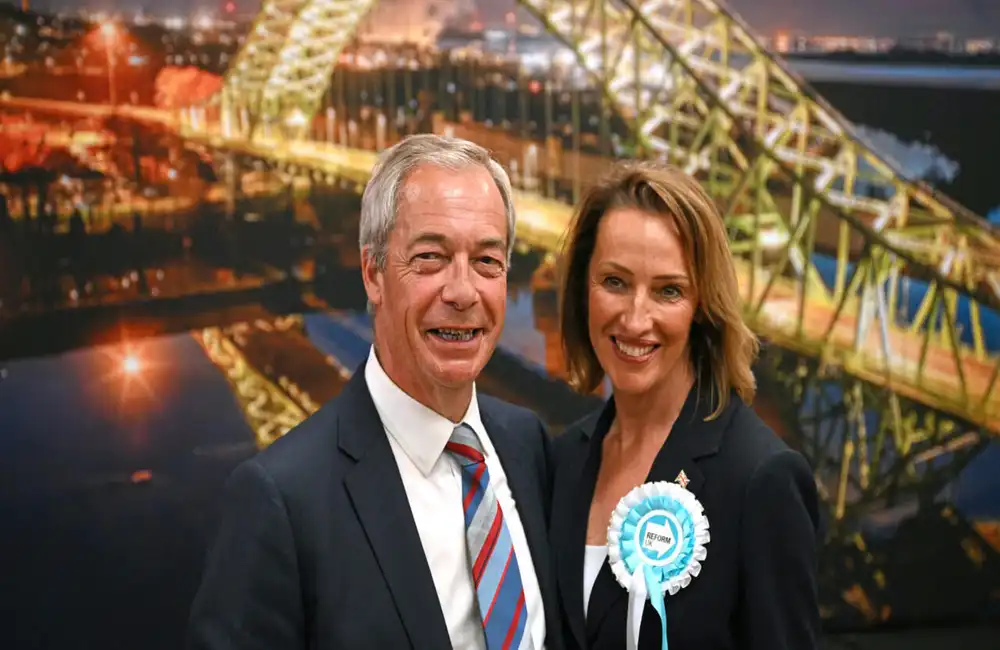Reform UK has stunned the political landscape once again, clinching a narrow by-election victory in Runcorn & Helsby by six votes.
Riding on sweeping gains in last weekend’s local elections, the party has solidified its standing as the official opposition, with Nigel Farage at its helm. For investors, these developments underscore the importance of understanding Farage’s background and policy priorities. His career trajectory, spanning high-stakes commodities trading and impactful political leadership, offers valuable insights into his approach to risk, negotiation, and economic planning.
1. Early Life and Family Background
Nigel Farage was born in October 1964 into a family steeped in financial tradition. His father, Maurice Farage, was a broker on the London Stock Exchange, navigating the trading floors of the City. These formative influences laid the groundwork for Nigel’s affinity for markets and his readiness to assume risk. Educated at Dulwich College, an institution known for producing public figures in both business and politics, Farage displayed an independent streak early on. At the age of eighteen, he bypassed university, opting instead to enter the City, where he began crafting the transactional skills that would later define his career.
2. Commodities Trading Career
2.1 Entry into the LME
Farage’s professional career began in 1982 at Drexel Burnham Lambert, where he honed his expertise on the London Metal Exchange. The LME, with its frantic pace and high-stakes trading, was the ideal environment for someone with a natural flair for sales and an ability to think rapidly under pressure. Four years later, he joined Crédit Lyonnais Rouse, sharpening his skills during a volatile period for global commodities markets.
2.2 Broker Roles and Skillset
Farage’s reputation as a consummate salesperson grew during his tenure at Refco in 1994, and later as part of the team at Natixis Metals. Known for juggling multiple phone calls in the smoke-filled trading pits, he thrived in the intensity that defined commodity brokering, building a client base reliant on his knack for closing deals. His ability to manage complexity and assess risk quickly became his defining attributes, skills that would later prove pivotal in his political pursuits.
2.3 Entrepreneurship and Insolvency
Farage demonstrated entrepreneurial ambition with the founding of Farage Futures in 1994. The brokerage quickly gained traction, reflecting his ability to identify market opportunities. However, by 2002, the firm was insolvent, a collapse that Farage attributed to excessive leverage and an unanticipated market downturn. Though costly, the experience was formative, teaching him to weigh risks with greater precision and to adopt a more disciplined approach to resource allocation.
3. Transition into Politics
3.1 Eurosceptic Roots
Farage’s interest in politics began with his 1978 membership in the Conservative Party, where Euroscepticism shaped much of his worldview. His opposition to the Maastricht Treaty led to his departure in 1992 and, soon after, his involvement in founding UKIP in 1993.
3.2 European Parliament Tenure
Farage gained further prominence in 1999, when he was elected a Member of the European Parliament. Re-elected in 2004 and 2009, he quickly became UKIP’s leading advocate, using his platform in Brussels to voice arguments against EU integration and promote British sovereignty. His speeches often drew on his trading background, framing policy arguments through the lens of risk and reward.
3.3 Rise of Reform UK
The launch of the Brexit Party in 2019 marked a new chapter in Farage’s political life. By 2021, it had rebranded as Reform UK, evolving into a broader platform addressing issues beyond Brexit. Under his leadership, the party achieved a significant milestone in May 2025, securing wins in key by-elections and local contests, cementing its role as the official opposition.
4. Political Policies Through an Investor Lens
4.1 Trade and Brexit
Farage’s hard Brexit stance prioritises full regulatory independence and bilateral trade agreements, particularly with the United States. For export-focused multinationals, this could mean both opportunities in reduced EU competition and risks from new tariffs and disrupted supply chains. Investors should monitor developments in trade talks closely, as sectors such as automotive manufacturing, agriculture, and financial services hang in the balance.
4.2 Energy and Commodities
Farage has been vocal in his support for domestic energy production and resource independence, advocating for coal mining, nuclear restarts, and increased UK gas exploration. While these positions could stabilise energy supplies, they are likely to introduce volatility for renewable energy stocks. Mining and utilities equities sensitive to fossil fuel incentives may benefit in the near term.
4.3 Fiscal and Regulatory Stance
Farage’s proposals to cut council taxes are paired with pledges for significant infrastructure investment, creating potential challenges for fiscal sustainability. Bond markets could see increased sensitivity to government borrowing levels, while construction and transport infrastructure sectors might experience a boost, depending on policy execution.
4.4 Immigration and Labour
Border control reforms remain central to Farage’s agenda. Proposals that restrict migration could pose challenges for labour-intensive industries, including agriculture, hospitality, and healthcare. Conversely, seasonal worker schemes, if well-executed, might mitigate labour shortages and stabilise these sectors.
4.5 Infrastructure and Industrial Revival
With campaigns urging citizens to “Buy British” and plans for green-belt development and rail electrification, Farage seeks to rejuvenate UK construction and manufacturing. Investors should watch for potential winners in industrials and related supply chains that align with these policy initiatives.
5. Ancillary Roles and Market Signals
5.1 Brand Ambassador for Bullion
Farage’s role as a brand ambassador for gold investments showcases an alignment between his political ideology and fiscal conservatism. By highlighting tax efficiencies and pension advantages, he has contributed to rising retail demand for safe-haven assets like gold during periods of uncertainty.
5.2 Media Influence
Through his presenting roles on GB News and his widely-followed podcast, Farage continues to influence public sentiment. Observers note that spikes in gold and gilt investments often coincide with key speeches or policy pronouncements from Farage.
6. Investor Implications and Risk Assessment
6.1 Market Sentiment
Farage’s public statements, particularly on Brexit, trade, and energy policy, have repeatedly triggered risk-off market responses. Safe-haven asset flows often intensify following his appearances, underscoring the need for portfolio hedging strategies.
6.2 Sector-Specific Calls
Energy and mining equities, infrastructure stocks, and export-driven businesses stand to gain or lose depending on the implementation of Farage’s policies. Investors should remain nimble, aligning allocations with policy execution and regulatory trends.
6.3 Political-Risk Premia
The rise of Reform UK as the official opposition introduces a new layer of political risk impacting UK equities. Investors must price in reform unpredictability, particularly in transport, construction, and consumer-facing industries. Foreign investors should also consider currency volatility linked to policy announcements.
7. Conclusion
Nigel Farage represents a unique convergence of commodities trading acumen and policy leadership. His trader instincts have informed his public career, shaping his approach to risk management and strategy. For investors, tracking Farage’s pronouncements and policy initiatives is not just advisable, but essential. His influence across financial, industrial, and consumer sectors will continue to shape market landscapes, offering both opportunities and challenges in equal measure.























